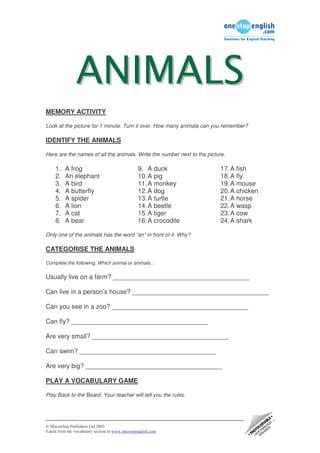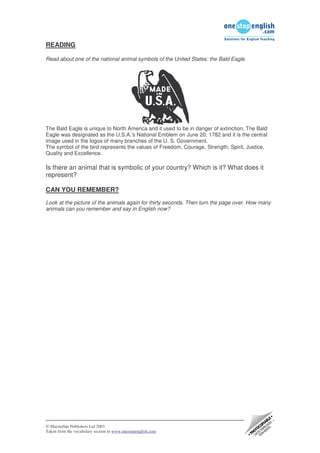Animals
- 1. MEMORY ACTIVITY Look at the picture for 1 minute. Turn it over. How many animals can you remember? IDENTIFY THE ANIMALS Here are the names of all the animals. Write the number next to the picture. 1. A frog 9. A duck 17. A fish 2. An elephant 10. A pig 18. A fly 3. A bird 11. A monkey 19. A mouse 4. A butterfly 12. A dog 20. A chicken 5. A spider 13. A turtle 21. A horse 6. A lion 14. A beetle 22. A wasp 7. A cat 15. A tiger 23. A cow 8. A bear 16. A crocodile 24. A shark Only one of the animals has the word ŌĆ£anŌĆØ in front of it. Why? CATEGORISE THE ANIMALS Complete the following. Which animal or animalsŌĆ” Usually live on a farm? ______________________________________ Can live in a personŌĆÖs house? ______________________________________ Can you see in a zoo? ______________________________________ Can fly? ______________________________________ Are very small? ______________________________________ Can swim? ______________________________________ Are very big? ______________________________________ PLAY A VOCABULARY GAME Play Back to the Board. Your teacher will tell you the rules. ┬® Macmillan Publishers Ltd 2003 Taken from the vocabulary section in www.onestopenglish.com
- 2. READING Read about one of the national animal symbols of the United States: the Bald Eagle. The Bald Eagle is unique to North America and it used to be in danger of extinction. The Bald Eagle was designated as the U.S.A.' National Emblem on June 20, 1782 and it is the central s image used in the logos of many branches of the U. S. Government. The symbol of the bird represents the values of Freedom, Courage, Strength, Spirit, Justice, Quality and Excellence. Is there an animal that is symbolic of your country? Which is it? What does it represent? CAN YOU REMEMBER? Look at the picture of the animals again for thirty seconds. Then turn the page over. How many animals can you remember and say in English now? ┬® Macmillan Publishers Ltd 2003 Taken from the vocabulary section in www.onestopenglish.com
- 3. Animals Vocabulary TeacherŌĆÖs Notes ŌĆō by Lindsay Clandfield Level: Elementary Aims: Students learn twenty four items of animal lexis. The tasks in this vocabulary lesson are all based around a picture of many different animals and involve students using the picture as a study guide for later revision of the animals. There is also a vocabulary GAME that the teacher can play with the students as part of the lesson. Like many of the American vocabulary lessons, there is a cultural sub-aim. In this lesson, students learn about a symbolic animal of the United States, the Bald Eagle and then discuss if their own country has a symbolic animal. Warmer ŌĆō Looking at a picture of animals If possible, photocopy the picture of animals onto an overhead projection and show it to the class. Otherwise make enough copies of it for every student in the class. Ask students to look at the picture for 1 minute, then turn it over (or turn the OHP off). How many animals can they remember seeing? Identify animals Depending on their level this stage may take longer or shorter. Students should write the number of the animal next to each animal on the picture (important: donŌĆÖt let students write the name of the animal on the picture ŌĆō as it will serve as a self study page for later). Students should work together in pairs or small groups to do this. Give each group a dictionary to help. At the end, drill pronunciation of the new words. Answer to note: The word ŌĆ£elephantŌĆØ has ŌĆ£anŌĆØ in front of it because it is the only animal word that begins with a vowel sound. Categorise the animals Now that the students are familiar with the animal names ask them to do exercise 3, which involves deciding which animals fit which categories. Sample answers: Note that these answers are quite subjective, and can vary from place to place, You decide, based on where you are, what ones you accept. Usually live on a farm? A pig, a cow, a horse, a chicken Can live in a personŌĆÖs house? A cat, a dog, a fish, a turtle, a fly Can live in a zoo? An elephant, a lion, a bear, a tiger, a crocodile Can fly? A bird, a butterfly, a wasp, a fly Are very small? A fly, a wasp, a butterfly Can swim? A fish, a shark, a duck Are very big? An elephant Back to the Board This is a vocabulary game. Divide the class into two groups. Ask one student to sit at the front of the class, with their back to the board. Write the name of an animal on the board. The people in that studentŌĆÖs group have to define the word on the board. If the student guesses correctly, they get one point. Give the group a time limit (30 seconds or less) to define each word. If a student doesnŌĆÖt answer correctly, the play passes to a student from the other group. Reading Ask students to read the mini article. Then ask them these questions: What is the name of the symbolic animal of the United States? When did it become the U.S. national emblem? What does it represent? Ask students if their country has an emblematic animal? What is it? What does it represent? Can you remember? Do this activity either at the end of the class or at the beginning of the next class. Ask students to take out their animal pictures again (or put up the OHP again) and look at it for thirty seconds. Then turn it over. How many can they remember now? ┬® Macmillan Publishers Ltd 2003 Taken from the vocabulary section in www.onestopenglish.com


